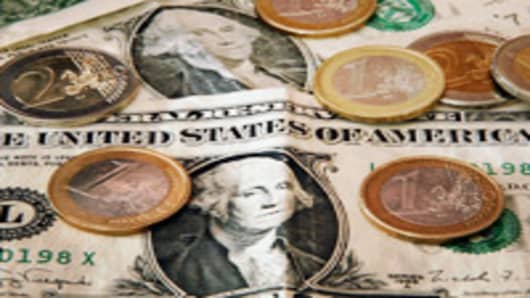The dollar snapped a three-day decline against the euro and gained on the yen Friday, as solid September retail sales suggested U.S. consumers continue to spend despite a weak housing sector.
Analysts said retail sales bode well for the U.S. economy and global growth, prompting investors to extend risky carry trades that use cheaply borrowed yen to buy higher-yielding assets.
The reassuring strength of consumer spending seemed to support those investors who think the Federal Reserve will not need to cut interest rates, which would undermine demand for the dollar, when it meets later this month.
"The numbers this morning indicate the Fed may not have to lower interest rates in October," said Mark Meadows, currency strategist at Tempus Consulting. "That should support the dollar over the next few days."
Alan Ruskin, chief international strategist at RBS Greenwich Capital, said in a research note that "as long as consumer spending is only slowing moderately, we are heading for a soft landing," adding it also reinforces signs that recent dollar weakness "is starting to run out of momentum."
Against the yen, the dollar last traded up 0.1 percent at 117.37 yen, though the euro eased back to 166.42 yen, flat on the day, after hitting a 2-1/2-month high above 167 yen on Thursday.
Against the dollar, the euro traded down 0.1 percent at $1.4177.
The retail sales data overshadowed a separate report on inflation which showed producers' non-food and energy costs eased last month.
Markets also largely overlooked a pullback in the Reuters/University of Michigan consumer sentiment survey for October, though some said the report may hint at future problems.
"Consumer sentiment was weaker than expected and we are likely to see the U.S. dollar weaken marginally over concerns of a possible retrenchment in the consumer sector," said George Davis, chief technical analyst at RBC Capital Markets in Toronto.
The dollar has been under steady selling pressure since the Fed slashed interest rates last month by half a percentage point to shield the economy from a deepening housing slump and a credit squeeze caused by losses on risky mortgage debt.
Traders said the euro's decline was limited after European Central Bank Governing Council member Vitor Constancio said the large U.S. current account deficit was unsustainable and would affect the dollar, which hovered near an all-time low near $1.4280 per euro set a week ago.
Other analysts added that euro gains may be capped by speculation that finance officials from Group of Seven countries will express concern about the euro's strength at a gathering in Washington next week.
Separately, European Central Bank Governing Council member Axel Weber said a change in ECB interest rates would be the wrong response to credit market difficulties. Weber's comments had limited impact on the currency market.


